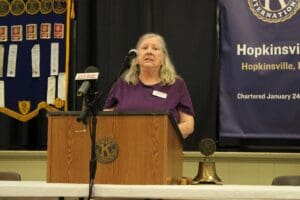Members of the Alzheimer’s Association shared how the disease affects people, updates on more accessible detection methods and treatments and how people can participate in this year’s Walk to End Alzheimer’s at Thursday’s Hopkinsville Kiwanis Club meeting.
Randa Ramsey, a member of the association, shared that her mother, grandmother and great grandfather developed Alzheimer’s Disease, and in her mother’s case doctors initially diagnosed her with dementia. Ramsey says doctors diagnosed her mother with Alzheimer’s two weeks before she passed away.
Ramsey shared that many Alzheimer’s cases go undiagnosed or misdiagnosed so she spotlighted some of the disease’s symptoms. The symptoms and warning signs include, memory loss, challenges solving problems, difficulty completing familiar tasks, confusion with time and place, trouble processing visual images and problems with speaking and writing.
According to recent studies, Ramsey shared that in Christian County around 12.4% of the population over the age of 65 has Alzheimer’s. Ramsey says many local cases of the disease are diagnosed too late for medication that could possibly slow the progression of the disease to have any affect.
For some to be officially diagnosed with the disease, Ramsey says doctors have to perform a spinal tap. However, she says blood tests have shown promise in being able to detect Alzheimer’s.
Along with easier detection methods, Ramsey shared that a new drug called Donanemab is said to slow the progression of Alzheimer’s, but only if it is given to a patient within the first 18 months that they start showing symptoms.
The drug can possibly slow the progression of the disease by six years.
Fellow association member, Alan Toliver shared that this year’s Hopkinsville Walk to End Alzheimer’s will be on October 5. Toliver says they are looking for walkers and donors with the goal of raising at least $60,000.
Toliver, says they have donated funds from the walk to the University of Kentucky and University of Louisville for Alzheimer’s research. More information about the Walk to End Alzheimer’s can be found at act.alz.org.


